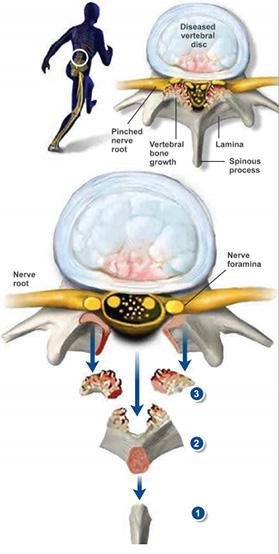Laminectomy – Fact Sheet

Overview
This procedure relieves pressure on the nerve roots in the spine. It is most commonly performed to relieve the pain of stenosis. This is a narrowing of the spinal canal that is often caused by the formation of bony growths that can press against the nerve roots. The surgeon may treat one or more vertebrae.
Removing the Spinous Process
First, the surgeon creates a small incision to access the spine. The spinous processes are the bony protrusions that stick out from the rear of the spine. The surgeon carefully removes the spinous process from the vertebra or vertebrae that need treatment.
Removing the Lamina
Next, the surgeon removes the lamina. This is the part of each vertebra that forms the rear portion of the spinal canal. Removing the lamina opens up the spinal canal, creating more space for the nerves. The surgeon may need to remove the lamina from more than one vertebra to fully relieve the pressure.
Clearing Bony Growths
The surgeon may also need to treat the foramina. These are the openings on each side of the vertebrae where the nerve roots exit the spine. The surgeon inspects these openings and clears away any bony growths that could press against the nerves.
End of Procedure
When the procedure is complete, the incision is closed with sutures or surgical staples. The patient is monitored in a recovery room. Physical therapy may be recommended as the spine heals.

 Menu
Menu